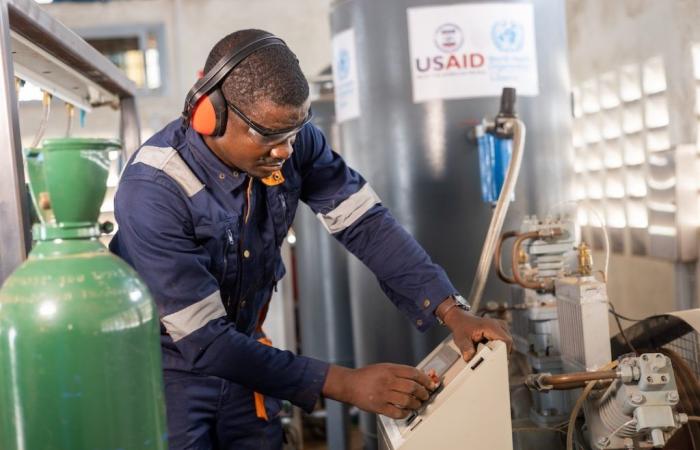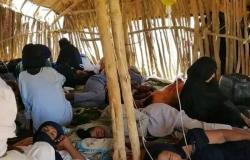Tubmanburg – Late one night, four-year-old Emerald, daughter of 44-year-old Irene Mabande, suffered a severe asthma attack at home in Tubmanburg, the capital of Bomi County, northwest Liberia . “She had difficulty breathing independently,” Irene recalls. “The hospital did not have a nebulizer for asthma patients and so putting her on oxygen was the only option to save her life. »
Reliable access to medical oxygen is an essential component of a robust healthcare system. This essential medicine supports crucial medical interventions and effectively addresses several health challenges. However, continued access to oxygen in Liberia remains limited, leading to preventable deaths, a situation made worse by the COVID-19 pandemic, during which the demand for medical oxygen has far exceeded the country’s capacity.
“This represented a major gap in our response to the pandemic,” said Dr. Adolfos T. Yeaih, Director of Emergency Response Services at Liberia’s Ministry of Health. “Additionally, the oxygen we were able to obtain from commercial sources was not pure enough to properly treat patients. »
To fill this deficit, local health authorities have, in 2022, with financial support from the European Union, USAID and the German Government, as well as the support of the World Health Organization (WHO), installed two state-of-the-art oxygen plants using pressure reversal adsorption technology. One is located at Star Base on Bushrod Island in Monrovia and the other at the Liberia Government Hospital in Bomi County.
“Oxygen supply was a real problem within this hospital. The establishment of the oxygen plant has been a great help for us.” Sylvester Tolgai, nurse anaesthetist, Liberia Government Hospital
Recognizing the importance of a continuous power supply to ensure sufficient and regular oxygen production, WHO also supplied and installed backup generators for these new factories, supplied diesel fuel and facilitated the connection of the Star Base plant to the national electricity grid in order to improve its reliability.
These new facilities were created to complement the three existing medical oxygen plants in Liberia, only one of which is capable of supplying oxygen to other health centers. In contrast, the new factories distribute oxygen cylinders to health centers in five counties, serving a population of approximately 2.3 million people. From April 2023 to June 2024, these factories produced and distributed a total of 4,551 bottles, providing crucial support to more than 2,000 seriously ill patients.
Irene’s daughter was one of the beneficiaries of this crucial intervention. Thanks to this initiative, the percentage of health centers and hospitals able to provide medical oxygen nationally increased from 51% in 2021 to 67% in 2023. “As soon as oxygen has been administered, she started breathing normally and her condition stabilized,” testifies Irene. “She has regained her strength. »
Sylvester Tolgai, a nurse anesthetist at Liberia’s public hospital, says that until recently, such a positive outcome was rare. “The oxygen supply was a real problem in this hospital,” he says. “The installation of the oxygen plant has been a huge support for us. This initiative allowed us to reduce the mortality rate in hospital. It constitutes a major breakthrough for us and for our patients. »
As part of an ambitious roadmap to expand access to medical oxygen in Liberia’s 15 counties, WHO supported the Ministry of Health by training more than 200 clinicians in oxygen therapy. Twenty biomedical engineering technicians were also trained to ensure safe use and maintenance of the new plants. Additionally, a training center has been established at the Star Base factory to ensure continued capacity building.
“Without the oxygen, she [my daughter] would not be here today.” Hawa Morris, mother
This roadmap also aims to renovate existing plants using pressure inversion adsorption technology, strengthen emergency preparedness and critical care support, install medical gas pipelines in all major referral hospitals in Liberia, and to equip ambulances with an adequate supply of oxygen as well as advanced resuscitation devices.
“Liberia has made significant progress in ensuring widespread access to quality medical oxygen,” says Dr Clément Peter, WHO Representative in Liberia. “As the COVID-19 pandemic has revealed, access to medical oxygen is crucial to saving lives. The country deserves credit for making this a priority in its quest for universal health coverage. »
In Tubmanburg, Hawa Morris, 39, plays with her 18-month-old daughter Princess in front of her house. Last year, Princess was admitted to Liberia’s public hospital with a serious bacterial infection. “Without oxygen, she wouldn’t be alive today,” says Hawa. “I am infinitely grateful. »






